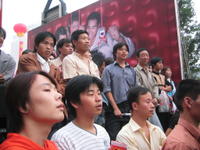Just back from a long weekend in
Guangzhou, where I stayed with a friend of a friend. In a way, it's my "village," if I have such a thing. My mother's mother left Guangzhou for Hong Kong. My father, born and raised in Shanghai, is Cantonese.
It was a change of pace to actually understand what everyone was talking about, if not every sentence. Before I started studying Mandarin again, I would've been able to string together several coherent Cantonese sentences. Now, my sentences come out mostly in Putonghua, with Cantonese words where I couldn't think of the Mandarin equivalent. It sounded atrocious but gave me the illusion of progress.
On the three-hour flight down, a yoga instructor gave a video demonstration of how to relieve stress. The all-Chinese bookshops in Guangzhou airport carried self-help books on how to grow your wealth. Passengers stood up the moment the plane landed (before it left the runway) and began shouting into their cellphones.
Guangzhou is more laidback and more lush and green than Beijing, but just as grey and choked with traffic. Population: 3.2 million. Parts resemble LA with crisscrossing freeways smack downtown. Other parts look like Hong Kong with worn skyscraper apartment blocks so close together it seems you can reach from one to another. Older parts of town remind me of Macau and its colonial Portuguese architecture.
Parks are full of fragrant frangipani trees and old Banyans with long, intertwined above-ground roots. There was plenty of streetlife along the Pearl River, from lovers to drunks to pickpockets, all bathed in fluroescent light. And good people-watching in DongShanHu Park and at the massive seafood
restaurants where you pick your own live dinner. It's like going to an aquarium and then eating the exhibits: big groupers, Australian lobster ($40 for just over a pound), wriggling silkworm larvae, snapping turtles, snakes and rockfish - which can kill if you step on one accidentally.
All the big restaurants seemed to have widescreen flat panel TVs and projection screens, tuned to news or blaring entertainment. A real-estate agent friend here said the louder the restaurant, the better. It's proof your evening has been really exciting. And Cantonese people are always eating. Morning tea before breakfast, afternoon tea following lunch, dinner in one restaurant and then dessert and drinks in another.
Tea bowls for cleaning your fingers after peel-and-eat shrimp are common in
Hong Kong and Guangzhou but not throughout China. So Chinese tourists are increasingly coming to Guangzhou and trying to drink from their finger bowls, even with the tell-tale slice of lemon in them, our local hosts said. One of our hosts who speaks Mandarin, Cantonese and English (is learning Spanish) said she felt like she had a different personality when she spoke Cantonese. She's more serious in Mandarin, much more expressive in Cantonese.
Had lakeside dim sum one day and a simple noodle lunch off a busy pedestrian street the next. Less than ten years ago, Shangxia Jiu pedestrian street was lined with old residences. Now it teems with people mostly in their 20's and 30's buying sneakers, wooden toys and cheap costume jewelry with their parent's money.
We walked through the narrow winding alleys of a jade market where the bright pink, purple and turqiose colors made you wonder why the other vendors bothered insisting that they were selling the real thing. In the east, we looked at old brick houses in the old Dongshan neighborhood. In the west we went to Siguan House, or the Liwan museum, to see the insides of what one of these old homes looked like.
Near the five-star Garden Hotel, where we waited for another friend to get off work, sidewalk cafes were full of expats: Koreans, Russians, Middle Easterners. Guangzhou is an hour and a half from
Shenzhen and Hong Kong and full of import export traders. That's especially true this week, during the annual Guangzhou Trade Fair, the biggest event in town. Pizza joints and belly dancing clubs as well as high fashion stores selling $300 jackets and $600 pants have cropped up to serve the traders as well as wealthy Chinese.









